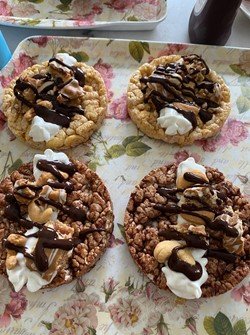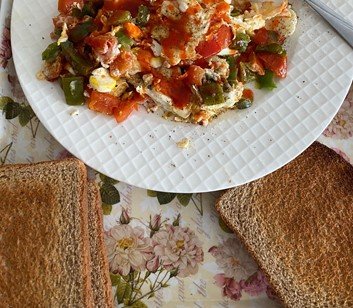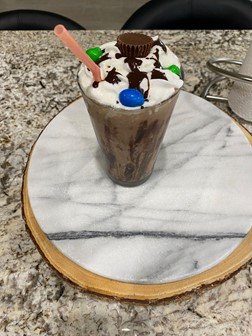My Fitness Journey during the Pandemic - Aman Waheed
Aman Waheed
2017 Undergraduate Transfer Scholar, University of Virginia
Aman is a Data Engineering Team Lead focused on cloud computing, DevOps, and scrum. He is a first-generation Afghan-American, raised in Northeast Philadelphia. He founded The Caring Consultants to help build bridges for low-income, first-generation, and nontraditional students to pursue the future career they desire. In his free time, Aman loves to run, train, and create delicious protein snacks.
My Fitness Journey during the Pandemic
I remember 2020 as a time that I allowed myself to get too comfortable. Basically, I rejoiced in working from home (WFH) and rarely attempted to exercise or make my own meal, being complacent with my physical health and letting myself go. Fast forward to mid-2021, I finally made a decision to reinvest in myself and prioritize my well-being and self-care. Let me explain: I did not have much direction but desired to improve my health, not simply to be physically fit, but have more energy to complete daily tasks, and improve my mental health and mood overall. Complete the many facets of being healthy. Since there is a lot to explain, let me break my journey down through three key parts: Fitness, Nutrition, Sleep. It may sound simple but the execution is always the most difficult part.
Fitness
Simply put, WFH definitely affected my mood negatively and, eventually, left me feeling tired all the time. The kickoff began by starting small and completing workouts at home, primarily doing sprints, jump rope, push ups – mostly anything not requiring gym equipment. After a month or so, the results were not coming in so it became time for something new. Then I discovered HIIT Training (high intensity interval training), and, slowly but surely, the weight dropped, dropped, and dropped some more. I began to notice that these early steps were going in the right direction and started to feel healthier!
After a few months, I signed up for a gym membership – not necessary but preferred – and started to incorporate weight training, which is more effective. I quickly learned that training sessions do not have to be long for it to be effective. Just less breaks between sets helped me maintain stress on my muscles and allowed me to see better results over-time. My workouts lasted between 45 minutes - 1 hour and 30 minutes, typically five days a week, depending on my competitive interests, energy levels, and mood. It was important to listen to my body no matter what, and would stop workouts if any pain or discomfort occurred. Personally, I aim to lose both fat and gain muscle, which is more challenging to do but still possible - but to accomplish this, I turned to my diet.
Nutrition
Nutrition played a major role in my results. By not eating clean it appeared as all the hard work I put in the gym did not translate to the facets of my health. Once I began to track my food consumption on MyFitnessPal and weighed my portions using a food scale, I consumed more calories than originally thought and, particularly, too much sugar. After catching this, it was time to turn the ship around and track my macronutrients (macros) more efficiently. Since my primary goal was to drop body fat, I followed this article from Men’s Journal to find a baseline of carbs, protein, and fat that worked for me – please note I did not copy the exact formula; there is an art to the science. The best strategy I found for myself was to follow a pattern and decrease calories slightly each week, while maintaining good eating habits and eating from nutritious sources.
Now that a structure was in place, the results came much quicker as I repeated the good habits. Consistency will go a long way. Of course, I even gave myself a small break on weekends for a cheat meal here and there and eating slightly more carbs during those refeed days. The best approach for me is to make good food tasty and bad food healthy. By learning to make your own meals and making food fun, you can keep the gains for the long-haul (see pictures below).
Making Food Fun
Sleep
I cannot stress this one enough. Sleep is naturally important for not only my physical health, but my mental health to recharge and start each day with the energy crucial to have a good morning workout, start work, complete daily tasks, and remember to eat after hours of focus! The difference between a 4 - 7 hour sleep cycle, for me, was and still is noticeable. If I did not get enough sleep, workouts were skipped and I finished my daily routine earlier due to the low energy that brought me down and affected my mood.
In terms of fitness goals, I did not see great results or lose much weight if my recovery was not emphasized. Recovery includes stretching every few days or a yoga session - which is great for anyone. I found it important to take care and pay attention to both the body and mind.
Hopefully, the blog (and links!) provide an insightful read into my life and how I achieved my fitness results dropping from 180 pounds to 140 pounds and under 10% bodyfat. Most importantly, the facets of my health are all improving, as I continue to learn, refine, and grow. Trial and error is the technique I use.
Every person will and should have a tailored journey, and my goals may not even align with yours – it is totally fine! Remember, a lot of rewarding achievements are difficult for a reason and this is no different. My final tip: Find what works, be consistent, do not quit.





